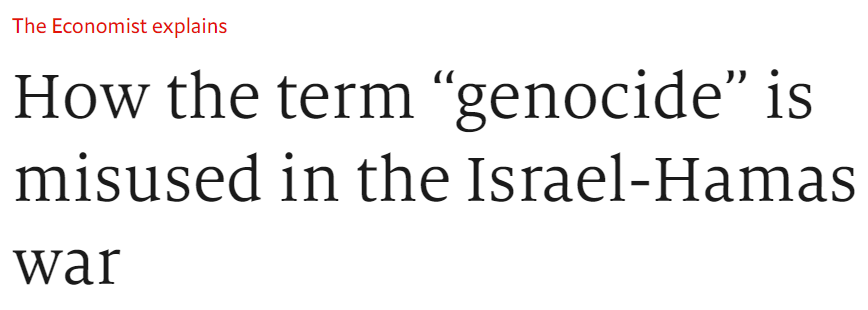Is the term “genocide” misused in the Israel-Hamas war?
Thu 16 November 2023The Economist published an article on November 10 reflecting its views on the ongoing Israel-Hamas war (or the Gaza massacre, to label it precisely). The article, consisting of roughly 800 words, doesn’t have an author but has a small-font decoration above the title: “The Economist explains.” If an economist were to explain genocide to me, I would be skeptical about their knowledge of the topic, but perhaps The Economist is 100% different. The article has exactly zero references, making it easy for me to study the material since all facts must be contained in the article. I’ll assume The Economist explainers are experts of genocidal studies, that they’ve checked everything, and drew up the soundest conclusion that the term is misused because they’re absolutely legitimate to discuss the topic.

Accusation of intent
What does The Economist explain?
Israel, by contrast, does not meet the test of genocide. There is little evidence that Israel, like Hamas, “intends” to destroy an ethnic group—the Palestinians. Israel does want to destroy Hamas, a militant group, and is prepared to kill civilians in doing so. And while some Israeli extremists might want to eradicate the Palestinians, that is not a government policy.
Let’s break it down. “There is little evidence that Israel, like Hamas, “intends” to destroy an ethnic group—the Palestinians.” The question of “intent” has often been difficult to prove in past genocidal cases; so let’s see what evidence I can find on “intent” in 10 minutes.
On October 13, Israeli President Isaac Herzog announced on CNN: “It's an entire nation out there that is responsible. It's not true. This rhetoric about civilians not aware, not involved, it's absolutely not true.”
“The Palestine Red Crescent Society (PRCS) condemns the intentional targeting of PRCS medical teams by Israeli occupation forces in the Gaza strip, resulting in the tragic killing of four PRCS paramedics in less than half an hour today, despite prior coordination.” (source)
Tzipi Navon, a close adviser and office manager for Prime Minister Benjamin Netanyahu’s wife, Sara Netanyahu, publicly called on Israel to torture Palestinians in Gaza: “We keep saying to flatten Gaza, flatten Gaza, and I think that's not enough.”
An Israeli army reservist spoke (while wearing military fatigues) said: “Be triumphant and finish them off and don’t leave anyone behind. Erase the memory of them. Erase them, their families, mothers and children. These animals can no longer live. . . . Every Jew with a weapon should go out and kill them. If you have an Arab neighbour, don't wait, go to his home and shoot him. . . . We want to invade, not like before, we want to enter and destroy what’s in front of us, and destroy houses, then destroy the ones after it. With all of our forces, complete destruction, enter and destroy. As you can see, we will witness things we’ve never dreamed of. Let them drop bombs on them and erase them.”
Israel Katz, Minister of Energy, wrote: “We will fight the terrorist organization Hamas and destroy it. All the civilian population in Gaza is ordered to leave immediately. We will win. They will not receive a drop of water or a single battery until they leave the world.” Notice that the use of “they” could infer “civilian population” instead of Hamas. I’m sure his office forgot to check it before publishing publicly on Twitter.
Hmm, it seems the economists at The Economist were so busy critically scrutinizing the 800-word work that they forgot to monitor viral videos and accounts of the top Israeli officials and their close affiliates on Twitter. I’m sure something like this happens to prominent news organizations always; it’s no big deal. They’re humans, and this was definitely not deliberate.
The five clauses
Recall that the definition of genocide is: any of the following acts committed with intent to destroy, in whole or in part, a national, ethnical, racial or religious group, as such:
Killing members of the group;
Causing serious bodily or mental harm to members of the group;
Deliberately inflicting on the group conditions of life calculated to bring about its physical destruction in whole or in part;
Imposing measures intended to prevent births within the group;
Forcibly transferring children of the group to another group
Neither do the Israelis display any obvious intent to prevent Palestinian births. But those who accuse it of genocide point to the large number of civilians killed, at least 10,000 so far, and claim its blockade of the strip meets the “conditions-of-life” criterion. The Israelis have clearly inflicted “serious bodily or mental harm” on the Palestinians. They have also displaced people from the north of the strip. If those people are not allowed to return, this could be considered a partial destruction of their territory or, as Jan Egeland, a former un head of humanitarian and relief efforts, has warned, a forcible population transfer.
Let’s first correct The Economist. There is no fixed number of civilians killed in a genocide. 10,000 or (in fact, 1,200) doesn’t matter. What matters are those 10,000 individual lives destroyed with the intent to destroy the “group,” in whole or in part, and more importantly, “as such.” They have successfully admitted that clause (1) is satisfied (never mind the “group” or “as such” clauses).
Furthermore, they state that Israel has inflicted (2), and (3) cases above (under the guise that “those who accuse it of genocide point to…”). Even though it satisfied three out of five criteria, and there is room to discuss intent, the term is definitely misused. Because The Economist explained so.
Conclusion
Well, we took the article and dissected some of the arguments of The Economist. I am sure they were written by expert economists with credible academic backgrounds in genocide studies and did their due diligence. Through their 800-word no-reference essay, they have thus accused scholars, human rights activists, and others of misinterpreting what Raphael Lemkin coined the term for. The ‘cide’ of the ‘genos’: two nuclear bombs may have already dropped in 1 month, but that doesn’t apply to the Gazans. Israel is only murdering Hamas, and the 10,000+ lives only died due to Hamas’s use of human shields. Absolutely true.
Since The Economist said so, let’s condemn the Israeli genocide scholar Raz Segal for publishing “A Textbook Case of Genocide.” He is a joke and his books are jokes. The entire field of Holocaust and genocidal studies who respect him and his Master of Arts in Holocaust and Genocide Studies program at Stockton University is a joke. The Genocidal studies are only about remembering that the Jews died, and “never again” means “never will we study genocide again unless Israel is the victim.”
Additionally, we must curse the Center for Constitutional Rights (CCR) because they used their legal understanding to prepare a 44-page report stating that “Israel is attempting to commit, if not actively committing, the crime of genocide in the occupied Palestinian territory, and specifically against the Palestinian people in the Gaza Strip.” They must be Hamas sympathizers for sure.
Originally published on Substack at https://penguing.substack.com/p/is-the-term-genocide-misused-in-the.
 Damodar Dahal
Damodar Dahal
